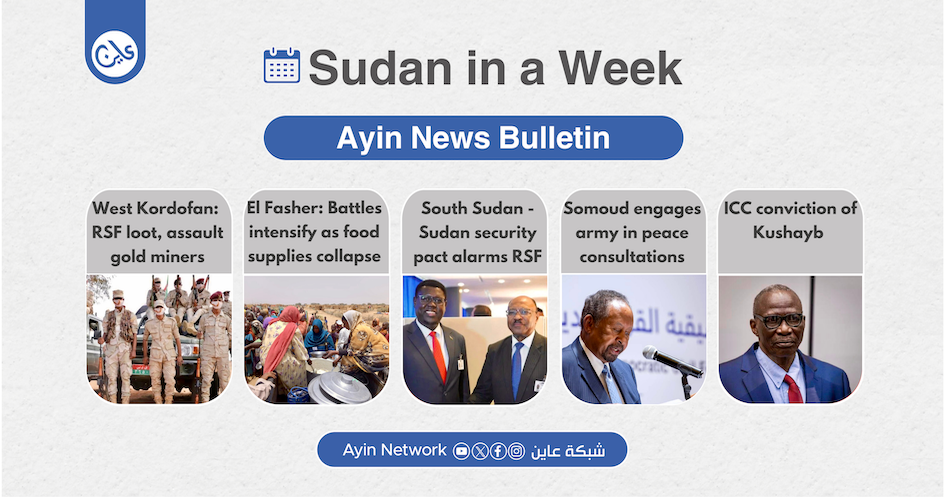Sudan in a week: Ayin News Bulletin #4
7 October 2025
To keep our readers informed of the multitude of events taking place in Sudan amidst the ongoing, devastating war, we have developed a series of weekly news briefs, covering nine major topics of the week.
In this week’s edition:
- 1. West Kordofan: RSF loot and assault gold miners
- 2. El Fasher: Battles intensify as food supplies collapse
- 3. RSF drone attacks shatter calm in Kordofan
- 4. Cyanide mining reignited in Northern Sudan
- 5. Sudan–South Sudan security pact alarms RSF
- 6. Somoud engages the army in informal peace consultations
- 7. ICC conviction of Kushayb welcomed as justice for Darfur
- 8. The UN Council extends the Sudan Fact-Finding Mission
- 9. Sudanese protest outside Egyptian consulate over visa restrictions
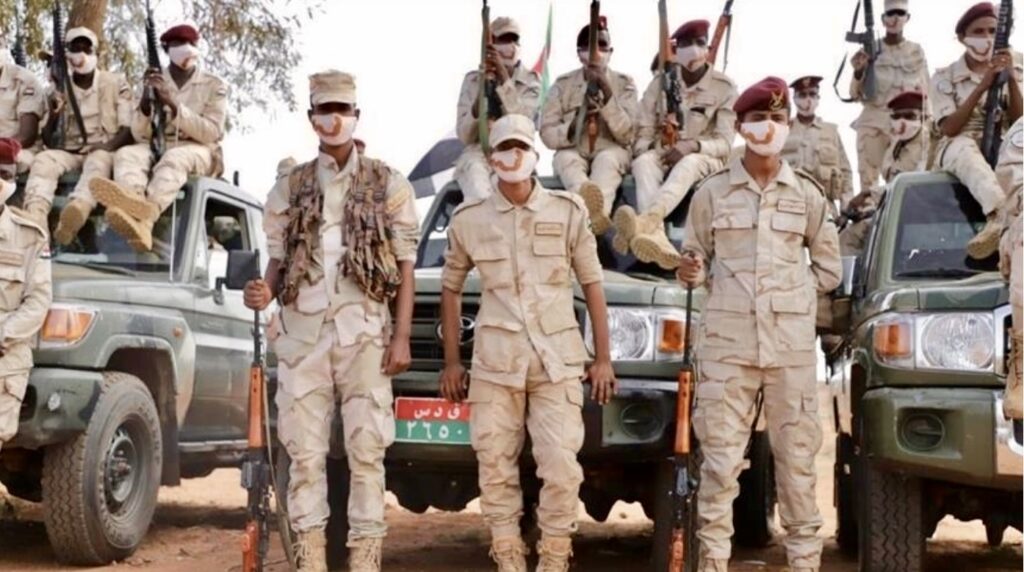 1. West Kordofan: RSF loot and assault gold miners
1. West Kordofan: RSF loot and assault gold miners
The Rapid Support Forces (RSF) have expanded their presence in traditional mining areas of West Kordofan State, looting gold and assaulting miners in the region. Artisanal miners around Fuga, northwest of the city of Nuhud, told Ayin that RSF fighters routinely raid mines at night, stealing gold-bearing stones at gunpoint and firing indiscriminately to terrorise workers.
According to local sources, thousands of miners—many displaced by the conflict—now face worsening insecurity and exploitation. “RSF militants seized control of several productive wells and brought in their workers to operate them for their benefit,” one miner said, requesting anonymity due to fear of reprisal.
Residents reported that the looting includes gold ore, mobile phones, and food supplies. Armed fighters reportedly arrive in combat vehicles, seize the extracted stones, and leave before dawn—a routine described as “a daily occurrence.”
Artisanal mining has been one of the few remaining sources of livelihood in West Kordofan since RSF forces captured Nuhud and Al-Khawi in May, forcing thousands to flee into villages and goldfields. However, even these remote areas are no longer safe.
Miners say RSF personnel fire live ammunition into gold wells while workers are inside, prompting many to abandon the sites entirely. “These areas produce little gold, but people have no choice,” one miner said. “They work under constant threat because there are no other jobs left.”
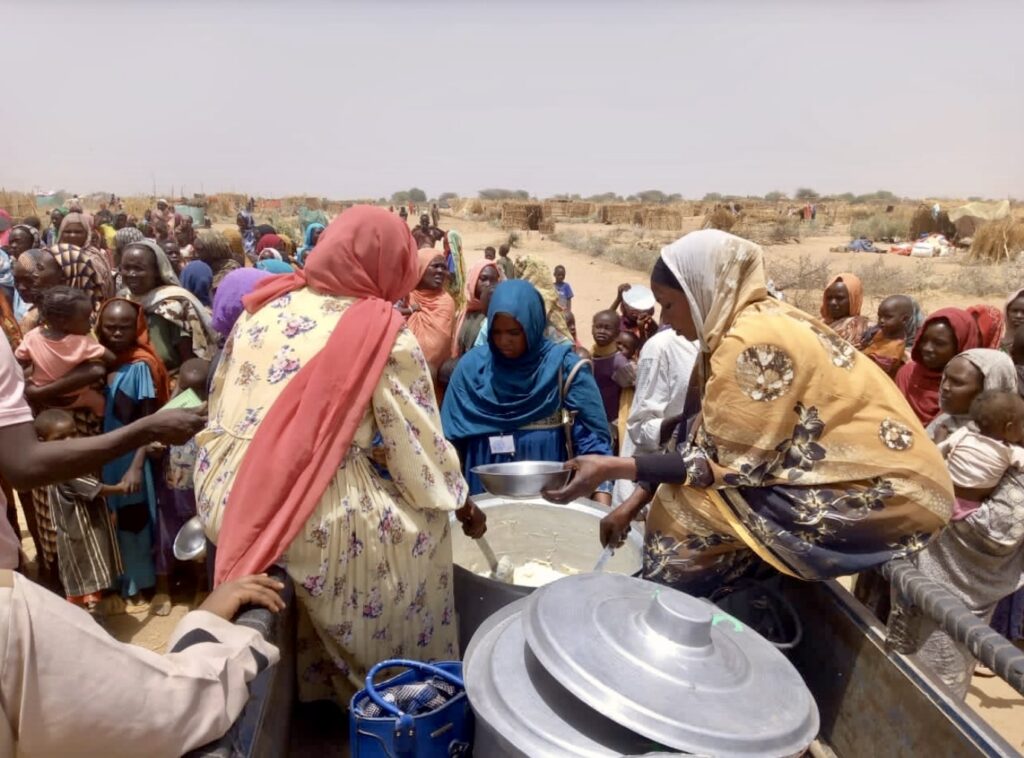 2. El Fasher: Battles intensify as food supplies collapse
2. El Fasher: Battles intensify as food supplies collapse
The Sudanese army conducted a second successful airdrop this month on its besieged headquarters in El Fasher, North Darfur, as fierce battles with the Rapid Support Forces (RSF) continue. Residents reported that two army warplanes flew over the city at dawn on Tuesday while RSF drones bombarded residential areas.
Heavy fighting broke out Monday following a three-pronged RSF attack, which the army and allied joint forces repelled. The El Fasher Resistance Coordination Committee said RSF fighters killed numerous civilians in their homes during the assault, and they urged residents near combat zones to move to safer neighbourhoods.
The city’s humanitarian crisis has worsened dramatically. An Ayin correspondent reported that communal kitchens providing free meals have shut down completely following the closure of markets, leaving thousands without access to food.
Civilians trapped in the city face constant shelling and shortages of food, water, and medicine. “People are living under siege,” one resident said. “The markets are closed, aid cannot enter, and prices for the few available goods are impossible.”
The RSF has maintained a blockade around El Fasher for months, attempting to capture the army’s last stronghold in Darfur. The renewed fighting underscores the escalating struggle for control amid a deepening humanitarian catastrophe.
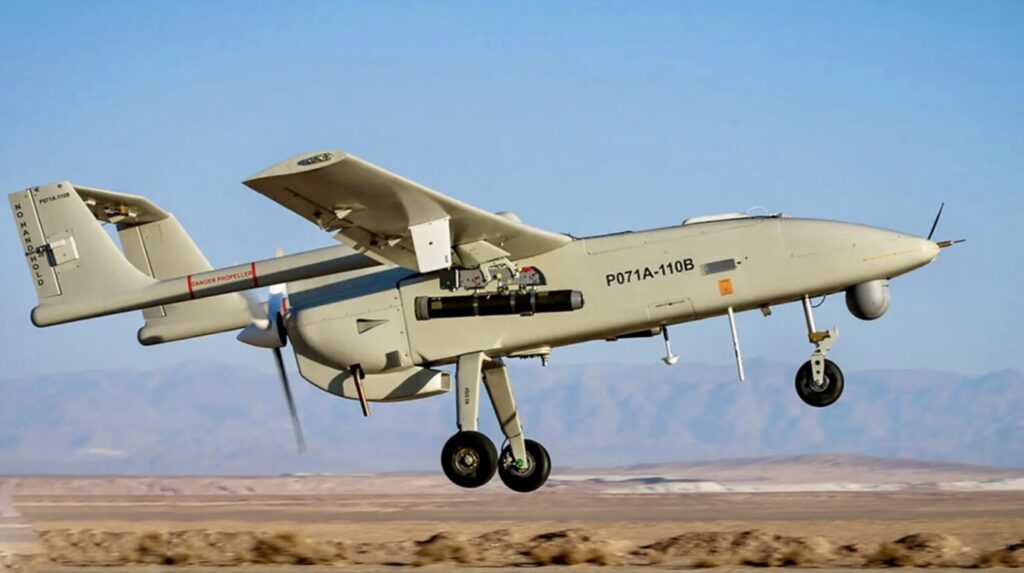 3. RSF drone attacks shatter calm in Kordofan
3. RSF drone attacks shatter calm in Kordofan
Drones believed to belong to the Rapid Support Forces (RSF) struck military and civilian targets in El Obeid, North Kordofan State, on Sunday evening, breaking a brief lull in fighting across the region. Local sources said the attacks hit areas near the army command, Al Obeid Airport, and two hospitals.
While no civilian casualties were reported, residents described the strikes as the most intense in weeks. “Before the drones, we heard heavy gunfire in the west of the city,” one source told Ayin. “Later, we learnt that soldiers were firing in celebration over false rumours that the army had retaken Nuhud.”
The army said in a statement that RSF drones targeted hospitals and residential areas, causing limited damage to facilities but no deaths. It condemned the attacks as “violations of international law and norms of war.” The RSF has not commented.
The same night, drones also targeted Kosti in White Nile State, though without casualties, according to local reports.
Despite the recent escalation, military operations in Kordofan had largely quieted last week. The army remains positioned along key defensive lines west of El Obeid, while the RSF continues to hold several towns on the eastern and southern axes.
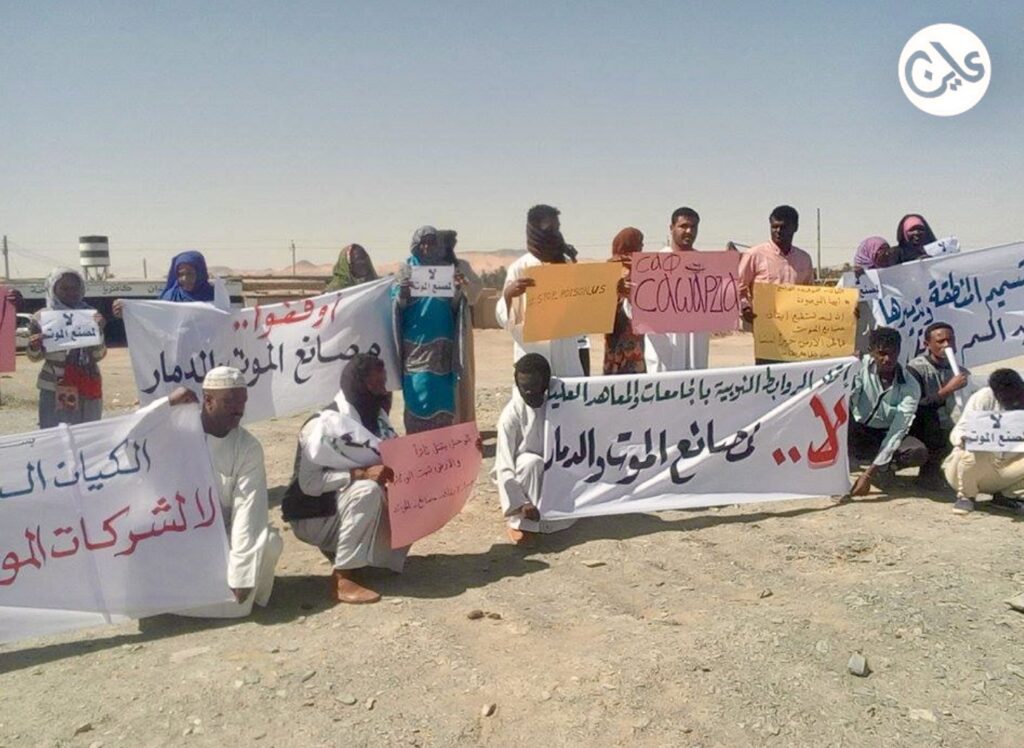 4. Cyanide mining reignited in Northern Sudan
4. Cyanide mining reignited in Northern Sudan
Security forces have forcibly reinstated a cyanide-based gold processing operation in the Sawarda area of northern Sudan, reviving a project long opposed by residents for environmental and health risks. Local committees say police and mobilised personnel reconnected electricity to the controversial plant, which is owned by a company linked to Sudan’s intelligence service.
Since the plant’s construction in 2016, just four kilometres from the Nile River, residents have resisted cyanide mining. Widespread protests and sit-ins had prevented its full operation. Although the Ministry of Minerals ordered its relocation in 2019, the decision was reversed after the 2021 military coup.
The Six-Party Committee, a local activist group, condemned the recent move, calling it an “exploitation of wartime conditions to operate death factories.” Members said security forces arrested three residents for opposing the plant’s reopening.
The committee also revealed another illegal cyanide facility operating in the nearby Kweika area, accusing authorities of collusion and disregard for environmental laws. “This is a direct threat to public health and the environment,” it warned.
Activists say the enforcement of toxic mining projects amid ongoing conflict reflects the government’s prioritisation of profit and military interests over citizens’ safety.
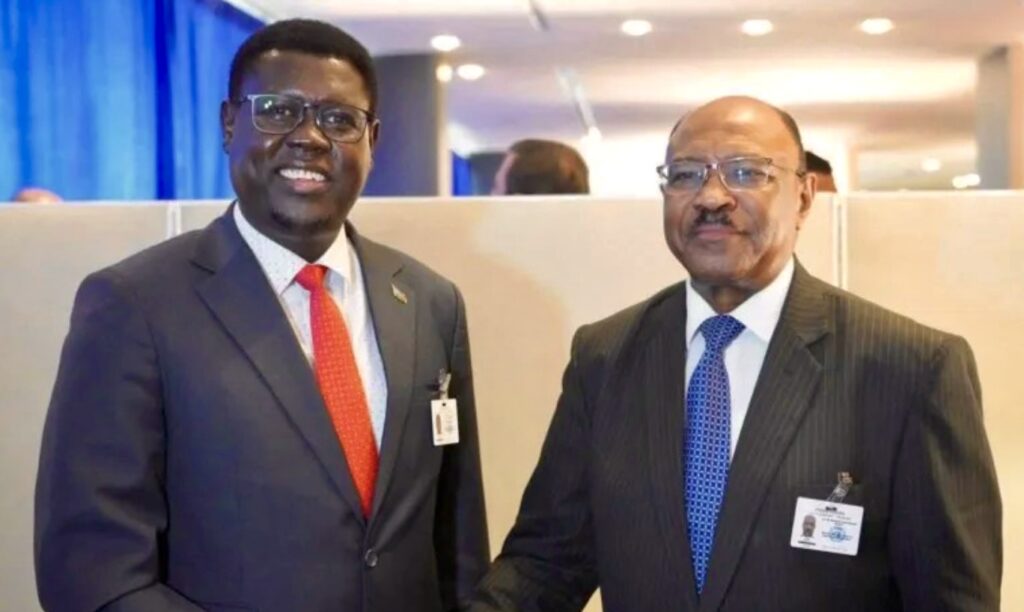 5. Sudan–South Sudan security pact alarms RSF
5. Sudan–South Sudan security pact alarms RSF
A new security agreement between Sudan and South Sudan has raised alarm within the Rapid Support Forces (RSF), which fear the deal could restrict their cross-border supply routes. The agreement, signed after high-level talks in Port Sudan, calls for joint border control, intelligence sharing, and enhanced security cooperation.
South Sudanese Foreign Minister Mande Samaya met Sudanese leaders—including General Abdel Fattah al-Burhan and Prime Minister Kamil Idris—during a three-day visit concluding on October 6. The two sides agreed to exchange information between security agencies and protect oil installations and trade routes.
Security experts say the agreement threatens RSF operations across South Darfur, South Kordofan, and West Kordofan—states bordering South Sudan and currently under RSF control. Researcher Mujahid Fath al-Rahman told Ayin the pact “could block the RSF’s access to fuel, medical evacuation routes, and gold exports through the southern border.”
Sudan’s Foreign Minister Muhieddin Salem said both countries also discussed establishing a free trade zone in Port Sudan to facilitate South Sudan’s imports.
Analysts believe the deal strengthens the army’s regional alliances and isolates the RSF, which has long benefited from porous southern borders to sustain its war effort.
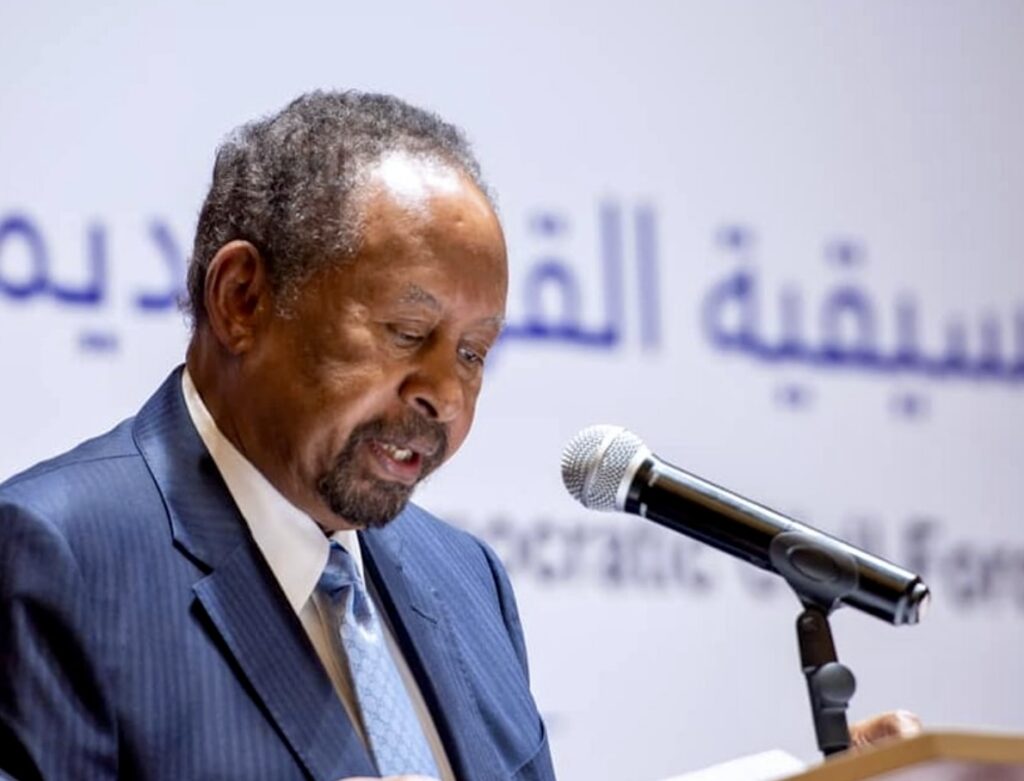 6. Somoud engages the army in informal peace consultations
6. Somoud engages the army in informal peace consultations
Sudan’s civilian coalition Somoud has opened informal channels with senior army leaders to press for an end to the war and revive the political process, sources told Ayin. The discussions are taking place alongside Egyptian-led efforts to broker a ceasefire under the Quartet initiative, which also includes the U.S., Saudi Arabia, and the UAE.
A source in the Somoud alliance said the talks are “not official” but focus on encouraging the army to embrace the Quartet’s roadmap and distance itself from hardliners advocating continued warfare.
Egyptian Foreign Minister Badr Abdel Aty visited Port Sudan in late September, where he met General Abdel Fattah al-Burhan to deliver the Quartet’s latest proposals, including a three-month humanitarian truce and transitional governance steps.
A former Sudanese diplomat confirmed that the Egyptian mediation aims to persuade the army to accept the truce, paving the way for renewed negotiations with civilians.
“Egypt is keen on ending the war in Sudan,” Abdel Aty said after his meeting with Burhan. The Quartet has held multiple meetings in recent weeks in Washington and New York to push for an end to hostilities.
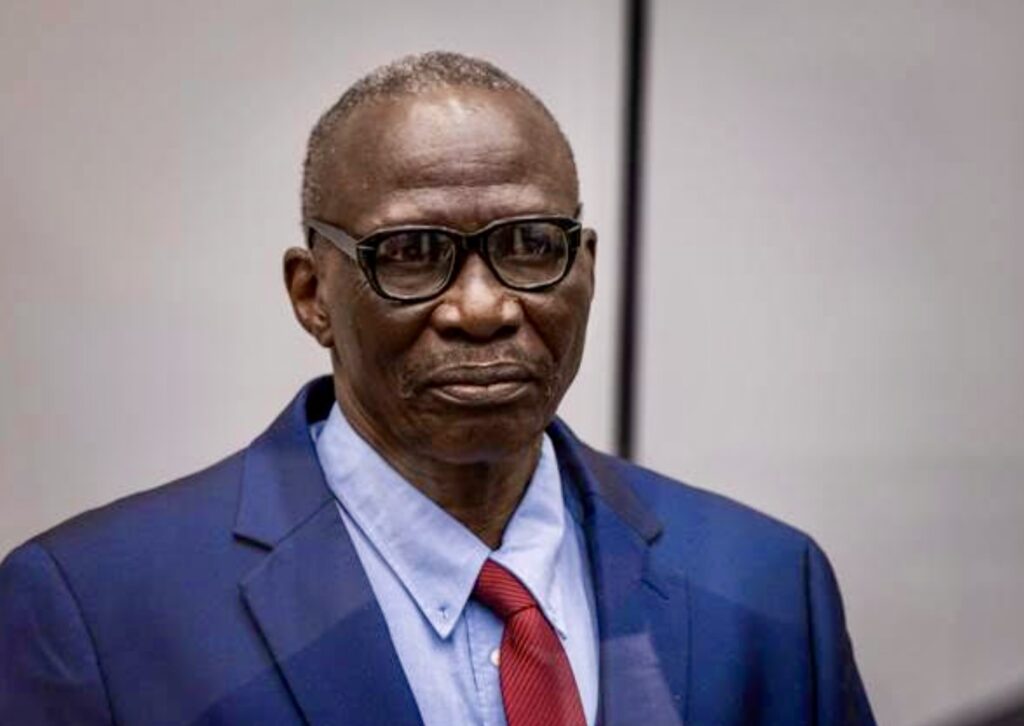 7. ICC Conviction of Kushayb welcomed as justice for Darfur
7. ICC Conviction of Kushayb welcomed as justice for Darfur
The International Criminal Court (ICC) has hailed the conviction of former Janjaweed leader Ali Muhammad Ali Abd al-Rahman, known as Ali Kushayb, as a historic milestone for justice in Sudan. The ICC found Kushayb guilty on 27 counts of war crimes and crimes against humanity for atrocities committed in Darfur between 2003 and 2004.
UN Human Rights Chief Volker Türk called the verdict “a long-awaited victory for victims,” stressing that similar crimes are still being committed in Darfur today. ICC Deputy Prosecutor Nazhat Shamim Khan said the judgement “closes the impunity gap” and shows that perpetrators will face justice “no matter how long it takes.”
Sudanese civil and political groups also welcomed the ruling. Somoud coalition leader Khaled Omar Youssef said it represents “justice for victims of the genocide committed by the former regime.” The Sudan Liberation Movement, led by Minni Arko Minawi, called for the Rapid Support Forces to be designated a terrorist organisation, saying their current crimes mirror those of the Janjaweed.
Other activists described the verdict as a symbolic trial of the entire National Congress regime, which orchestrated Darfur’s atrocities. They urged continued prosecutions, including against former president Omar al-Bashir and other senior figures.
Though subject to appeal, the verdict marks the ICC’s first conviction in the Darfur cases—two decades after the crimes occurred—and renews hope for accountability amid Sudan’s ongoing conflict.
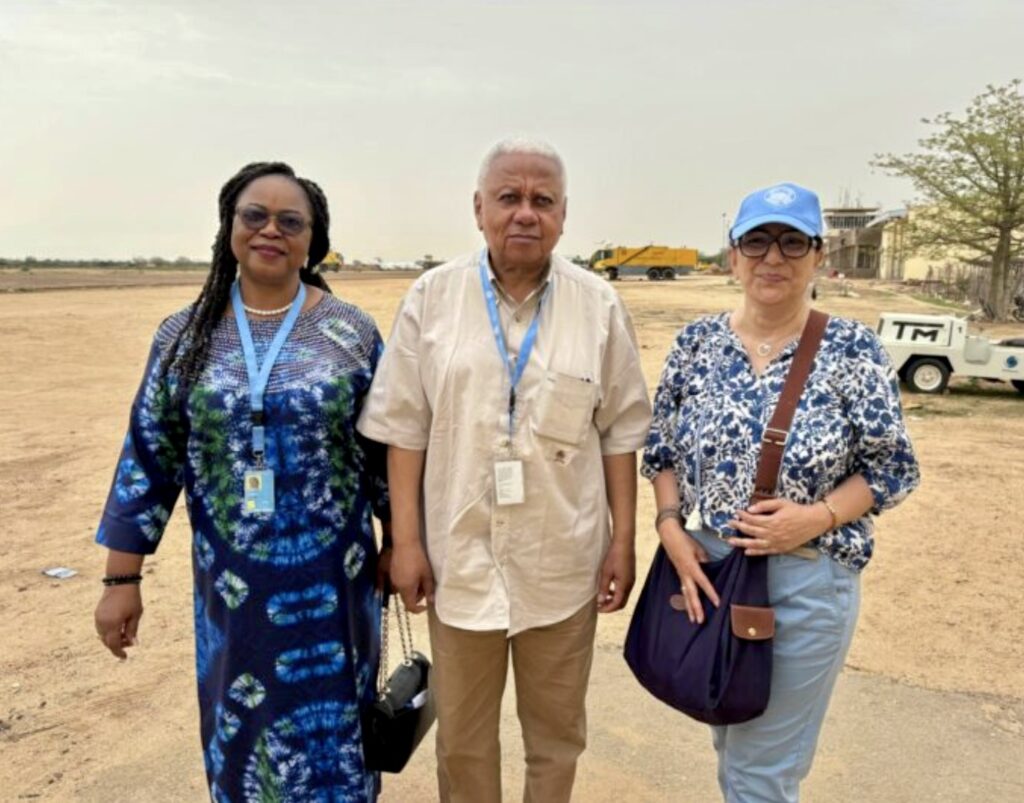 8. The UN Council extends the Sudan Fact-Finding Mission
8. The UN Council extends the Sudan Fact-Finding Mission
The UN Human Rights Council has voted to extend the mandate of its fact-finding mission in Sudan for another year, despite opposition from the country’s military-backed government. The resolution passed with 24 votes in favour, 11 against, and several abstentions.
The Council condemned widespread violations by both the Sudanese army and the Rapid Support Forces (RSF), including extrajudicial killings, ethnic violence, and indiscriminate airstrikes. It said the abuses “amount to war crimes and crimes against humanity.”
The resolution urged Sudan to end impunity, protect civilians, and cooperate with international investigators. It also highlighted that transitional justice and reparations are essential for lasting peace.
The mission’s latest report found both warring parties responsible for attacks on residential areas, hospitals, and civilians and recommended the creation of an independent mechanism to monitor ceasefire compliance.
Sudanese rights group Emergency Lawyers welcomed the renewal as an “important step amid unprecedented violations.” It criticised Port Sudan’s rejection of the resolution, calling it a continuation of the government’s refusal to uphold international law.
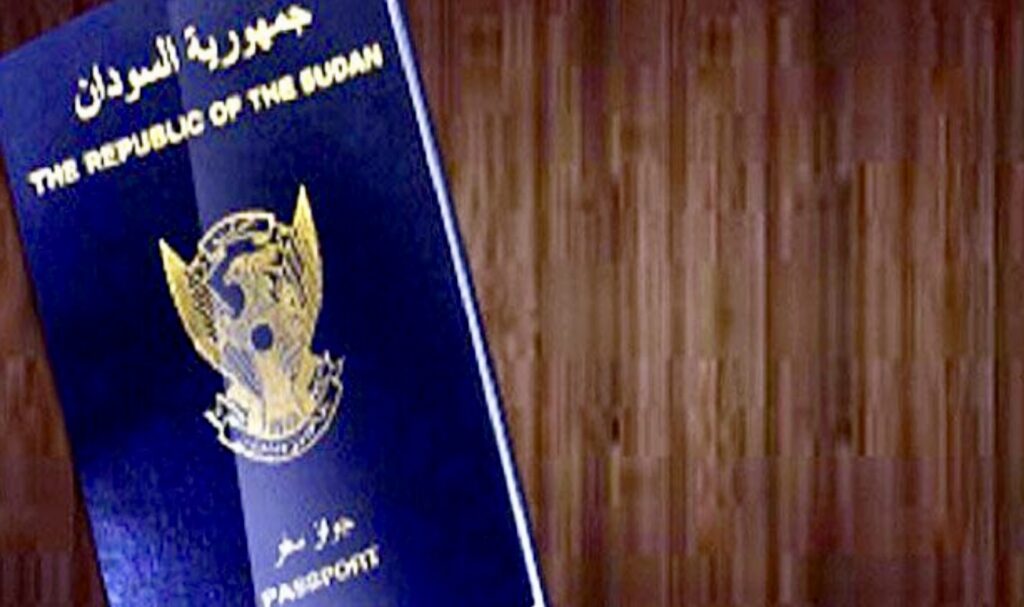 9. Sudanese protest outside Egyptian consulate over visa restrictions
9. Sudanese protest outside Egyptian consulate over visa restrictions
Dozens of Sudanese citizens staged a protest outside the Egyptian consulate in Port Sudan on Thursday, October 2, denouncing Cairo’s tightening of visa regulations and the reported sale of entry permits on the black market for up to $2,500.
The demonstrators accused Egyptian authorities of denying visas to thousands of Sudanese students, patients, and families seeking to reunite with relatives in Egypt. Using a megaphone, a protest spokesman alleged that “Egypt is denying thousands of students and patients entry and is leaking security approvals worth thousands of dollars through the parallel market.”
Despite police attempts to disperse them, the protesters continued their demonstration outside the consulate, demanding transparency and fairness in the visa process.
Since June 2023, Egypt has sharply restricted entry for Sudanese nationals, reversing its earlier policy of open borders during the initial months of Sudan’s war between the army and the Rapid Support Forces (RSF). The restrictions have stranded many Sudanese seeking safety or medical care across the border.
Egypt has hosted around 1.5 million Sudanese refugees since the conflict began, according to official estimates. However, the Voluntary Return Committee reports that more than 400,000 people have returned from Egypt to Sudan in 2025, reflecting worsening economic and legal conditions for refugees.
Protesters in Port Sudan said they would continue voicing their opposition until the Egyptian government ends the exploitative visa system and eases restrictions for those fleeing the ongoing war.


